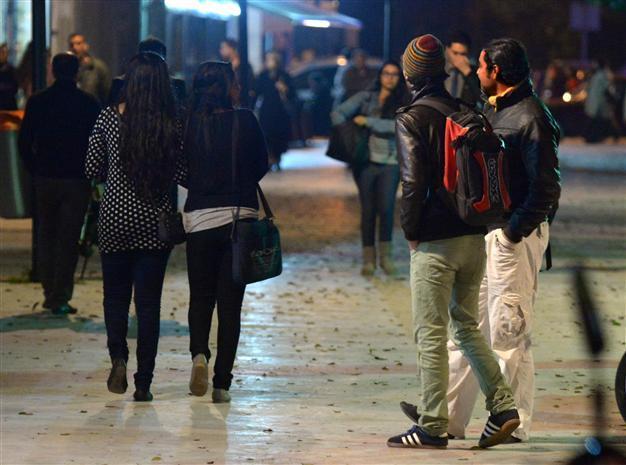Morocco Islamists under fire over women abuse bill
RABAT – Agence France-Presse

Two girls walk in the street as men look at them in Rabat on November 25, 2013. AFP Photo
A long-awaited law to combat violence against women is currently under study in Morocco, but the Islamist-led government has had to revise its proposals after sharp criticism from rights groups.A preliminary version of the bill, which is still in the drafting stage, threatens prison sentences of up to 25 years for perpetrators of violence against women. In addition, the bill would take unprecedented steps towards criminalizing sexual harassment, with those convicted risking possible three-year jail terms.
As in numerous other Arab countries, sexual harassment of women is commonplace in Morocco, despite the adoption of a new constitution in 2011 that enshrines gender equality and urges the state to promote it.
But despite the progress that this new law would represent, women’s associations have strongly criticized the proposed legislation. In particular, they accuse Bassima Hakkaoui, the minister for women’s affairs -- herself a member of the ruling Islamist Party of Justice and Development -- of excluding them from the drafting of the bill.
“We have waited for years for this law and we are now very disappointed by its content,” said Najat Errazi, who heads the Moroccan Association for Women’s Rights, speaking in Casablanca at a meeting to discuss the bill.
According to a study published by the state planning commission (HCP) this week, nearly nine percent of women in Morocco have been physically subjected to sexual violence at least once. Sexual violence of a physical or psychological nature has affected some 25 percent of women overall, and a startling 40 percent among 18- to 24-year-olds.
Last year, Hakkaoui acknowledged the problem by stating that six million women have suffered physical or verbal violence, more than half inflicted by their husbands.
Sara Soujar, another activist speaking at the meeting in Casablanca, argued that the bill fails to include provisions relating to single women. “This category is totally absent... Reading the text, you get the impression that violence basically only affects married or divorced women, even though others may be more exposed,” she said.
Her concerns resonate with the findings of the HCP study, that around one in every two unmarried women in Morocco was subjected to sexual violence -- whether physical or verbal -- during the year that it was carried out.
“Young women who work in factories or as housemaids, many of whom are minors, are no less exposed,” Soujar said. Others criticize the draft law for lacking clarity, noting that it deals with sexual violence against women and children in the same clauses.
In the face of these objections, the government has been forced to set up a committee, headed by Islamist Prime Minister Abdelilah Benkirane, to review the draft law and demonstrate its willingness to cooperate.
Progress is being closely followed in Morocco, where many have had traumatic personal experiences of a kind that the proposed legislation is designed to deter.
Last weekend, dozens of people gathered outside parliament in Rabat to denounce “all forms of violence against women,” among them members of civil society groups as well as relatives of the victims.
















